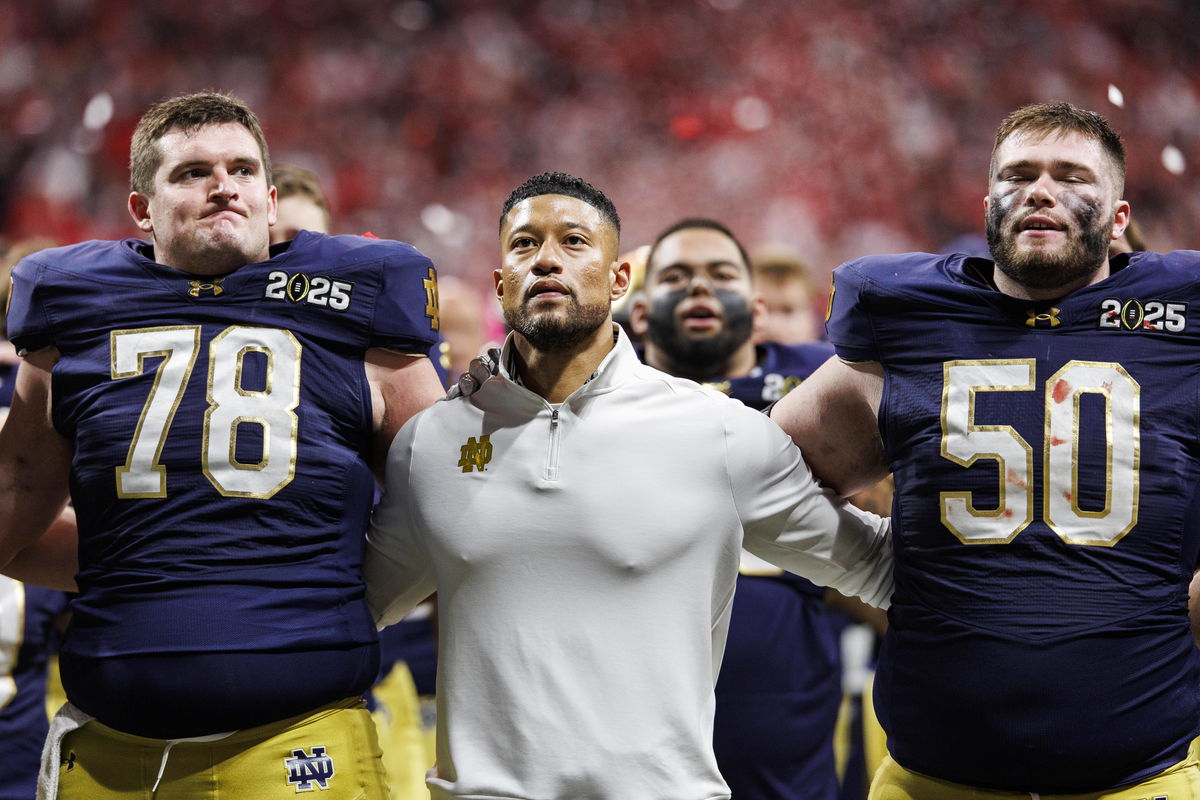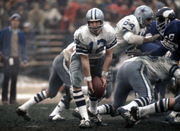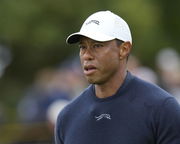
Imago
NCAA, College League, USA Football 2025: CFP National Championship Ohio State vs Notre Dame JAN 20 January 20, 2025: Notre Dame head coach Marcus Freeman, Notre Dame offensive lineman Pat Coogan 78, and Notre Dame offensive lineman Rocco Spindler 50 sing the Alma Mater after College Football Playoff National Championship game action between the Ohio State Buckeyes and the Notre Dame Fighting Irish at Mercedes-Benz Stadium in Atlanta, Georgia. John Mersits/CSM/Sipa USA Credit Image: John Mersits/Cal Media/Sipa USA Atlanta Mercedes-Benz Stadium Georgia United States of America NOxUSExINxGERMANY PUBLICATIONxINxALGxARGxAUTxBRNxBRAxCANxCHIxCHNxCOLxECUxEGYxGRExINDxIRIxIRQxISRxJORxKUWxLIBxLBAxMLTxMEXxMARxOMAxPERxQATxKSAxSUIxSYRxTUNxTURxUAExUKxVENxYEMxONLY Copyright: xCalxSportxMediax Editorial use only

Imago
NCAA, College League, USA Football 2025: CFP National Championship Ohio State vs Notre Dame JAN 20 January 20, 2025: Notre Dame head coach Marcus Freeman, Notre Dame offensive lineman Pat Coogan 78, and Notre Dame offensive lineman Rocco Spindler 50 sing the Alma Mater after College Football Playoff National Championship game action between the Ohio State Buckeyes and the Notre Dame Fighting Irish at Mercedes-Benz Stadium in Atlanta, Georgia. John Mersits/CSM/Sipa USA Credit Image: John Mersits/Cal Media/Sipa USA Atlanta Mercedes-Benz Stadium Georgia United States of America NOxUSExINxGERMANY PUBLICATIONxINxALGxARGxAUTxBRNxBRAxCANxCHIxCHNxCOLxECUxEGYxGRExINDxIRIxIRQxISRxJORxKUWxLIBxLBAxMLTxMEXxMARxOMAxPERxQATxKSAxSUIxSYRxTUNxTURxUAExUKxVENxYEMxONLY Copyright: xCalxSportxMediax Editorial use only
New Year’s Day was supposed to be all fireworks, beads, and Bourbon Street vibes before Notre Dame and Georgia squared off in the Sugar Bowl. Instead, it turned into one of the darkest nights in college football history. Sirens cut through the confetti, chaos swallowed the celebration, and the news hit hard: a 42-year-old Army veteran carried out a terror attack in the heart of New Orleans. Fourteen lives were lost, 57 more were injured, and in that moment, Marcus Freeman realized football no longer mattered—the real challenge was leading a grieving team and community through unthinkable pain.
Watch What’s Trending Now!
That night flipped the city upside down. With the French Quarter on lockdown, law enforcement found an ISIS flag and pipe bombs in the attacker’s truck, confirming fears: this wasn’t random—it was a domestic terrorism act. Fans were trapped in hotels, the Superdome went silent, and for the first time in 90 years, the Sugar Bowl was postponed. Kickoff shifted from January 1 to the next day, with officials calling the delay a matter of life and death, not just logistics. By dawn, the reality was brutal—the most high-profile New Year’s Six bowl had been derailed by terror. Freeman wasn’t just Notre Dame’s head coach anymore; in that moment, he was the crisis manager for 100 kids and their families.
Speaking on The Pivot Podcast with Ryan Clark, Freeman peeled back the curtain on that night. Clark, whose son plays for the Irish, praised Freeman for leading with heart. The coach’s response? “You know, when I think about that moment that night, I remind myself like, life is a makeup of unpredictable moments. Like there’s unpredictable things that happen, and how you handle those unpredictable things, to me, determine the success.” He explained how he immediately gathered captains, trainers, and staff to strategize about keeping his players physically and emotionally grounded.
ADVERTISEMENT
Instead of locking his guys in meetings, Freeman flipped the script. “I didn’t want to sit here and make you guys do walkthroughs in a hotel when your parents are a block away and can’t even hug you.” His solution: bring the families in. Parents flooded the team hotel, embracing their sons, creating a cocoon of love in the middle of chaos. As Freeman put it, “Sometimes, love and family is bigger than just football.” No wonder rivals and ops love him.
By the time January 2 rolled around, the Superdome crowd stood in silence before kickoff, honoring victims. Notre Dame, heavy hearts and all, stepped into the storm—and flipped the script on Georgia. Riley Leonard cooked with classic old-school, tossing a touchdown and rushing for 80 yards. Xavier Watts played like his pads were lined with steel, shutting down Georgia drives. And Jayden Harrison’s 98-yard kickoff return? Straight electricity. The Irish stunned the Bulldogs 23–10, punching a semifinal ticket and earning their first New Year’s Six win since 1994.
The box score told one story, but the vibe told another. Notre Dame’s victory wasn’t just a W—it was a statement: grief wouldn’t define them. In Freeman’s words, it was “A reflection of the Notre Dame community, the football program, but the community in itself, you know, in tough times coming together.”
ADVERTISEMENT
CBS put Notre Dame on alert against Miami in a highly anticipated season opener
The scars of that New York tragedy are still fresh for Notre Dame, but Marcus Freeman knows there’s no pause button in college football. His job is to rally the Irish, turn heartbreak into focus, and carry that into the season opener that could define everything. And make no mistake, CBS has already put the heat on. According to the network’s Inside the Lines betting model, Sunday night’s clash at Hard Rock Stadium against Miami isn’t just a marquee matchup—it’s the swing game that could make or break Notre Dame’s Playoff shot before September even gets rolling.
ADVERTISEMENT
The math is brutal. Beat Miami, and the Irish sit at about a 78% chance to crack the College Football Playoff. Drop it, and that number tanks to 28%. That’s a 50-point swing off one single game, the kind of number that shows just how unforgiving independence really is. Miami, sitting at No. 10, can drop a big one in September and still make noise in the ACC title race. Notre Dame? No such cushion. No league, no championship game, no safety net. The Irish basically have to stack statement wins, and this is the first—and maybe the biggest—one.
And this isn’t just some random opener—it’s Notre Dame and Miami. Folks who remember the “Catholics vs. Convicts” era know exactly what this matchup means. The two sides have squared off 27 times, with the Irish holding a 17–8–1 edge, but the rivalry energy always felt bigger than numbers. The 70s and 80s cranked the animosity into high gear, and while things cooled off after the 90s, seeing both teams ranked inside the top 10 in primetime feels like those days all over again.
Top Stories
Prayers Pour In as Cowboys Legend Scott Laidlaw Passes Away at 72

LIV Golf Takes a Bold Swipe at Tiger Woods, Jordan Spieth & More PGA Tour Pros in New Feature for 2026 Season

‘Entitled’: Outrage Builds as Nelly Korda Opts Out of Important LPGA Events

LIV Golf Dealt With Another Heavy Blow Hours After Phil Mickelson’s Emergency Exit

Rafael Nadal Sets Boundary With Reporter During Australia Exit as Security Steps In

LIV Golf in Danger as Bryson DeChambeau Publicly Rejects Drastic Changes He ‘Didn’t Sign Up’ For

Then there’s the quarterbacks. Notre Dame is handing the keys to CJ Carr, a five-star freshman making his very first college start under the brightest of lights. No easing in against a MAC opponent, no quiet Week 1—Carr’s baptism comes against a top-10 defense, in Miami, with the Playoff stakes hanging over his head. Across the field, Carson Beck makes his Hurricanes debut with a little more seasoning, and Miami believes he can steady them from the jump. That contrast only adds juice: a blue-chip rookie versus a transfer who’s been through the fire.
ADVERTISEMENT
Add in Notre Dame’s No. 6 AP ranking, Miami’s No. 10 slot, ABC’s standalone Sunday showcase at 7:30 ET, and the playoff math CBS keeps hammering, and this opener doesn’t feel like Week 1 at all. It feels like a mid-season elimination game. For Marcus Freeman and a program still healing from tragedy, there’s no better chance to prove what they’re made of than right now, under the lights, with the whole country watching.
ADVERTISEMENT
ADVERTISEMENT
ADVERTISEMENT
.png)
.png)
.png)



